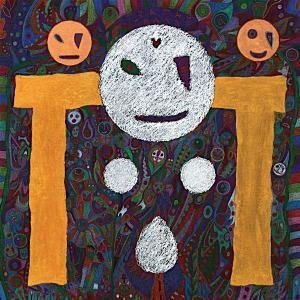Ever since the genesis of Current 93, way back in 1983, there’s been a brimstone scent of the apocalypse in the air. David Tibet, the group’s founder, core and only constant, is the quintessential English eccentric whose eye on the end of days has made Current 93 one of the UK’s most idiosyncratic underground acts. A man with a passion and obsession in his own oblique Christianity-sourced visions, Tibet’s lyricism is an outpouring of beautifully lunatic prose that swerves between the personal, the cryptic and the incomprehensible, often at the same time.
Baalstorm, Sing Omega is no great shift in the Current formula, and as with almost every Current 93 release there’s a contradictory and dense sense of the impenetrable and conceptual. If the album can be said to have a single concept then it’s to do with Tibet’s most famous preoccupation; the apocalypse. Current 93 is a continuously rewoven tapestry of Tibet’s dream-life, real-life and revelations (both the personal and the apocalyptic). It’s a somewhat odd and prickly paradox, but the most oft-cited issue that people have with Current 93’s records are actually with Tibet himself – the embodiment and essence of the band. As a vocalist he’s about as idiosyncratic as they can possibly come, a voice that takes the ‘marmite issue’ to the nth degree – fevered visions with an equally feverish delivery. To some, Tibet has a delivery that hovers near the central reservation of shrillness and theatricality, to others he’s a prophet of unknown texts bordering on revelation prodded hysteria. His vision might often be obscure, but it’s still capable, as it is here, of being fabulously rich. This is therefore one of Current 93’s most lyrically unfathomable releases yet, and that’s no mean feat for a band that has travelled as far as they have.
Current 93’s progression from their post-industrial loops roots, through occultscapes with a heavy Crowley lean and pastoral pentagram/pentecostal folk, has seen them recently arrive at hyper-visual prog-folk-rock preaching. Surprisingly sharp on the heels of last year’s Aleph at Hallucinatory Mountain and as the final piece of a trilogy, Baalstorm Sing Omega sees the band withdrawing from their recent heavier rock-rooted sound. Where the first two-thirds of the trilogy went for the horizon blotting sounds of a bigger, more typical rock aesthetic, the band here are a far gentler collective. Melancholia lies heavy in their hands.
Returning to something more akin to the ‘apocalyptic folk’ tag, these songs are formed mostly around exposed acoustic instruments and the rhythms of John Contreras’ cello and Baby Dee’s piano with an underpinning of swelling drones. The nine songs are built on melodies with a structure and mix that’s more ebb and flow rather than typical song craft. Tibet treads relatively lightly across the album, his vocal moving between scroll-dry passages in sibilant whispers and passages with the vernacular and force of the maddest visions of a strung-out John the Baptist. The input of 12-string player James Blackshaw and Eliot Bates’ Oud both retie Current 93 to their musical pastoral past while expanding it into other traditional folk forms. The comparative gentleness of Baalstorm, Sing Omega is maybe a sign of the calm after a storm in Tibet’s life, or the acceptance of the revelations of possible personal apocalypses – hellfire and the dusk of perception are in short supply. In either case, this is a record that has more in common with Current 93’s mid-90s period than the more recent hectoring and loud efforts. That’s not to say there aren’t the moments of beauty that mark of all of their records, but there is nothing here to radically distinguish it from a fair percentage of Current 93’s back catalogue. Its not a cop-out to say that much like The Fall, another quintessentially English band led by a unique vocalist/lyricist, Current 93 remain "always the same, always different".


